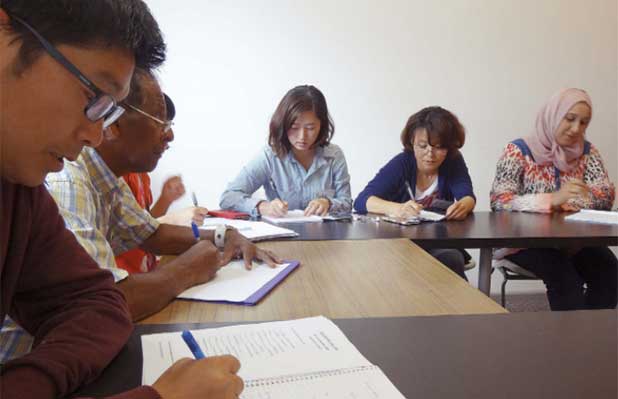Rev John Bartik, rector at Bankstown says the most successful English classes are run by people with a natural passion for evangelism and crossing cultures with the gospel.
“It’s all about the person running the class,” he says. “We have a woman [at the Bankstown church] who runs a simple English Bible study where she goes through Christian materials. She’s very passionate, warm, loving and welcoming. She has such a knack for it so she does quite well. She’s well fed and eager about seeing the gospel go forward.
“These people always have success because they spot those who are longing for something deeper in their lives and they give Christianity to them.”
Bartik worries that in an attempt to reach people from a non-English speaking background, teachers may unintentionally water down the gospel and miss the gospel opportunities. While people mean to be generous and accommodating, he sees a danger in lost opportunity.
“Our tendency is to boil things down and people will miss the rich Christian worldview that is there,” he says. “We shy away from theology because we are scared that those attending class can’t handle it. And at many times, they can’t – but it still has to be there.
“As teachers of ESL classes, we need to think about how we can stretch their understanding. What are they missing? What are we missing in our teaching to them? How can we take them to the next level? There needs to be an interchange between meeting them where they’re at and showing them the bigger picture of the gospel.”
One easy way for churches to build bridges between the weekly ESL classes and the church community is by having regular visits from ministry staff.
Says Mikey Bayliss, Anglicare’s ESL Western Region Co-ordinator and the ESL Training and Resources Co-ordinator: “I say to people, ‘Go and visit your ESL classes’ and they often ask me ‘Why?’. But the students have such a respect for the minister, and they really appreciate it when ministry staff attend. Ministry staff underestimate the encouragement they are. One of the first steps to people from ESL classes attending church is meeting the ministry staff.”
One minister who has seen fruit from visiting the English classes at his church is the Rev Canon Sandy Grant from St Michael’s Cathedral in Wollongong. He recently shared, in a blog on GoThereFor.com, that he previously hadn’t realised he could easily meet non-Christians by visiting those who were already on church property.
“Every week, people from all sorts of international backgrounds come voluntarily to our church to receive a genuinely useful service offered freely and lovingly,” he writes. “They are frequently keen to make friends. So now I go along to the English classes every week possible, just for the 30-minute morning teatime of conversation practice.
“Every week I have fascinating discussions learning about people’s families, backgrounds, cultures, interests and often sharing something of my own family. They generally realise I am the minister, and sometimes that results in questions. Other times, I find the natural opportunity to raise a matter of belief, moral values, or of practices like praying that are somehow related to God, Jesus, the Bible, or something that we do or get involved in at our church.”
Grant has also tried to strengthen relationships by taking the friendship outside the classroom context, inviting some of the male students to join him in a “cultural occasion” like watching the State of Origin together. He suggests that others can do this in different ways such as inviting students over for a meal, going out for coffee, or helping them with tasks and errands.
The team at Anglicare is keen to help churches in their ministry to people from a non-English speaking background. The primary way this happens is through supporting a parish’s ESL ministry.
“We aim to help churches have the support they need to do ESL ministry effectively,” says Mikey Bayliss, Anglicare’s ESL Training and Resources Co-ordinator. “We provide training, consultation and resources to churches. One thing we love to do is help churches connect with each other and share their ideas, joys and challenges.”
He is always delighted to see churches working in partnership with one another and says that while Anglicare cannot provide teachers or physically teach ESL classes at so many different locations, they seek to offer a network of assistance.
“We can be a support structure, and provide that support through training or other churches,” he says. “We want to help them continue serving and being sustainable.”
When a church is looking to start an ESL ministry, Anglicare equips them with what they need to begin, with five to six sessions worth of training that covers a range of topics including cross-cultural communication, teaching skills and how to use bibles in the class.
“It’s a hard ministry,” Bayliss says. “Some churches think that their standard of teaching should be better but we assure them that their students feel loved and so they are doing a great job. It’s hard because students come and go and there can be a lack of stability. But English classes are a way to serve people from a non-English speaking background and it blesses the local community and the church community.”
This is an excerpt from the Southern Cross Feature Article. You can read the context to this article here or download the full October Southern Cross here
























